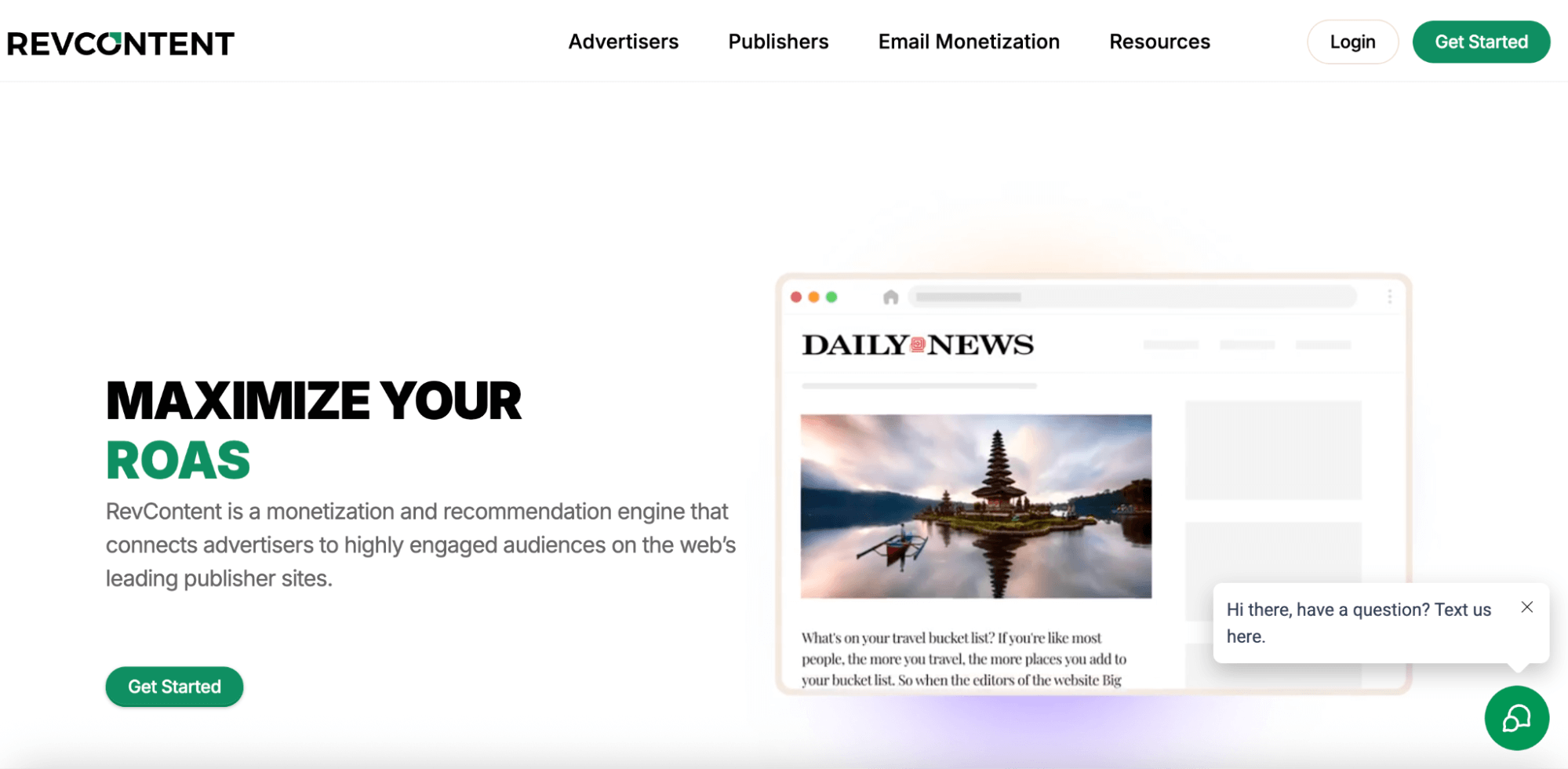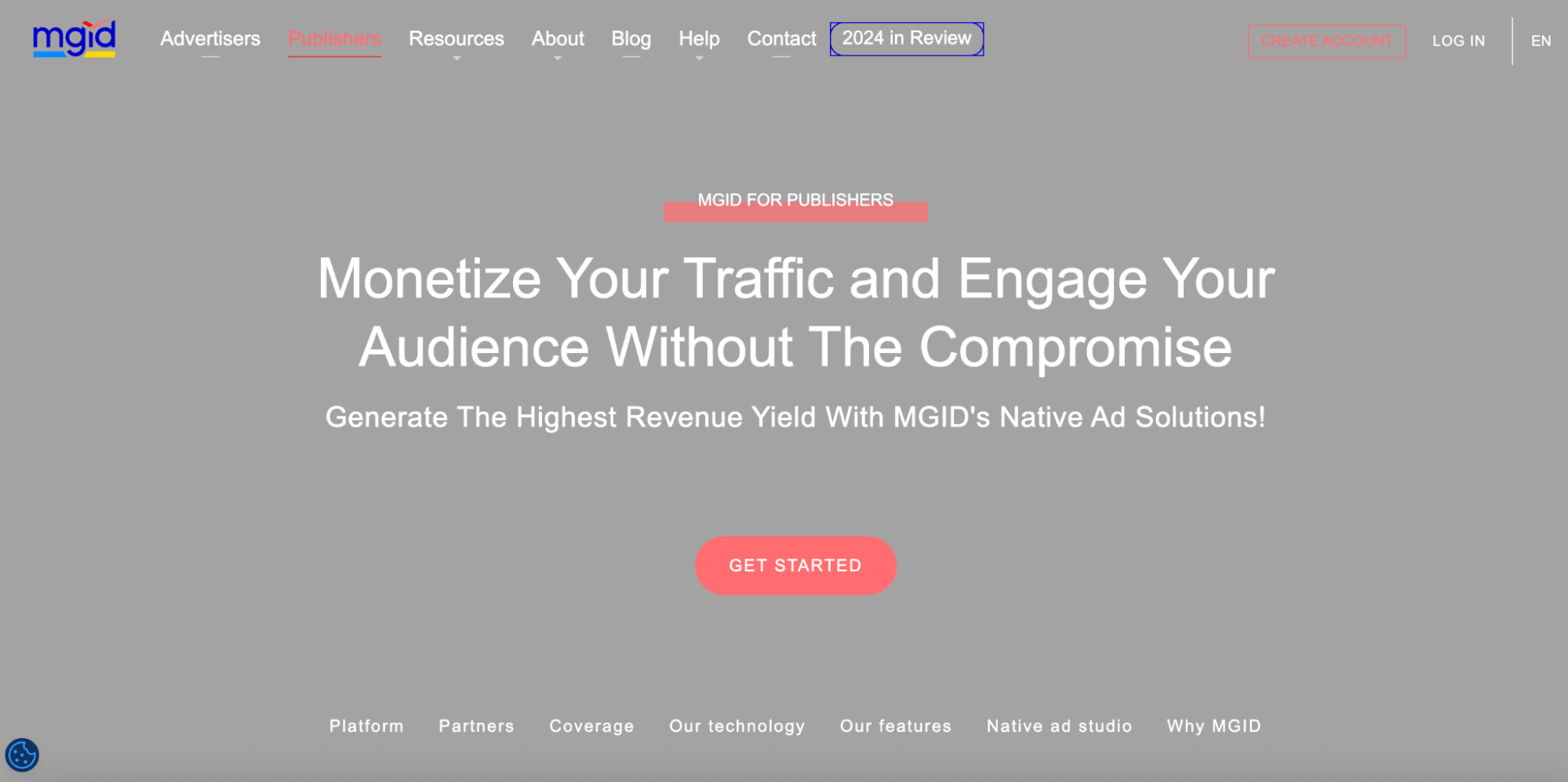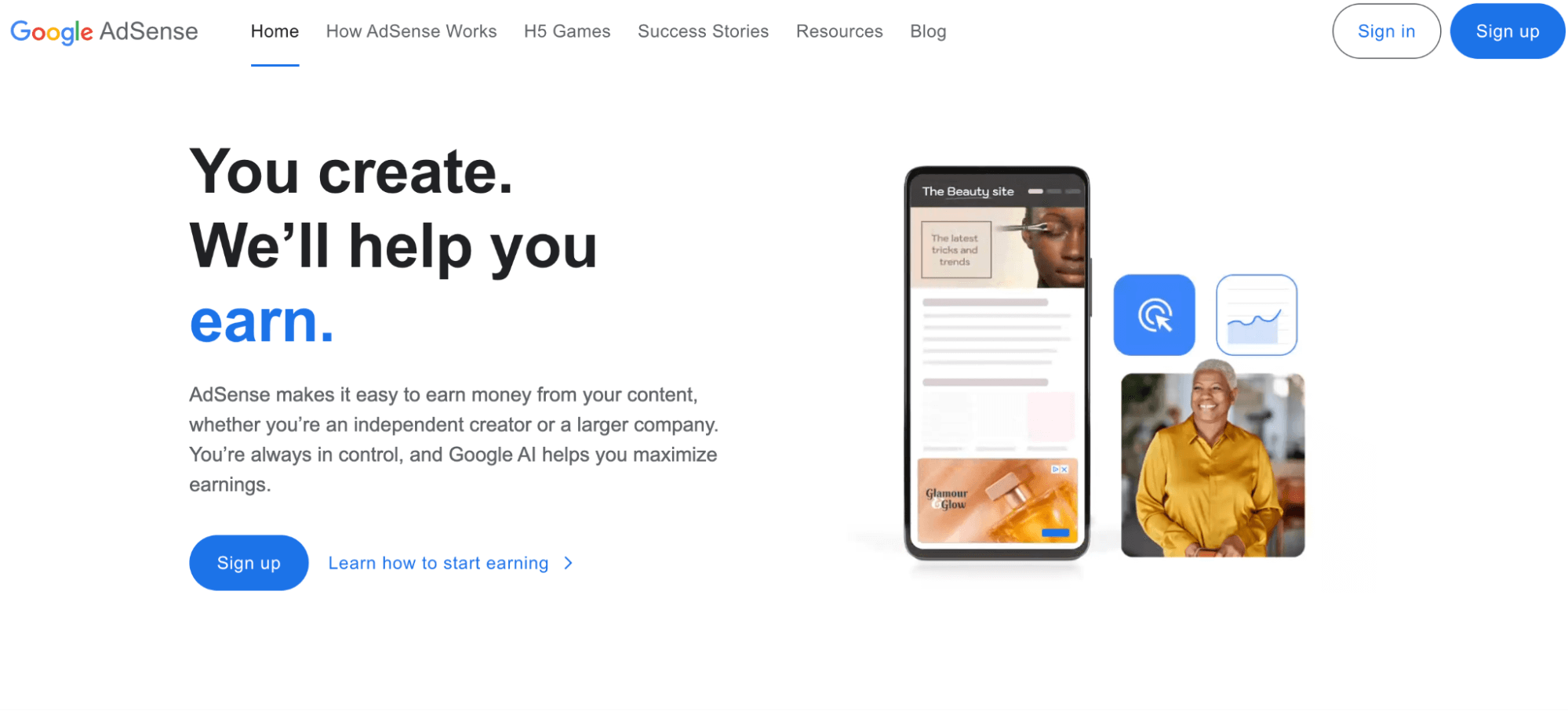| Service | Why choose over Outbrain | Things to consider | Best for |
|---|---|---|---|
| Monetag | No min. audience, diverse/non-intrusive formats, low payout threshold | User experience, best for remnant/multi-format, strong mobile | Small/medium/niche, mobile/remnant sites |
| Revcontent | Higher revenue share, simple control | Traffic quality, focused ad management | Large, focused publishers |
| MGID | Better culture, easier for new publishers | Smaller reach, personalized formats | Niche/new publishers |
| Google AdSense | More formats, global reach, control | User experience impact, ad quality standards | High-traffic, general sites |
| Yahoo Native | More control, mobile-first features | Support rating, ad format diversity | Mobile-centric, controlled |
| Ezoic | AI optimization, AdSense approved | Needs DNS setup, holistic monetization | Growing, optimization-focused |
| Valueimpression | Easier entry, high fill rate | Less brand prestige, network fill focus | Medium traffic, monetization |
Outbrain: What It Is and Why Marketers Look for Alternatives

If you’ve ever clicked on those “recommended stories” or “sponsored articles” at the end of an online news piece, you’ve probably seen Outbrain ads in action.
So, what is Outbrain?
At its core, Outbrain is a native advertising platform that helps publishers monetize their websites by showing content recommendations and sponsored posts. For advertisers, it’s a way to drive traffic, and for publishers, it’s a way to earn revenue from placements that blend naturally into their content.
But while Outbrain has a strong reputation, it isn’t always the perfect fit. Outbrain pricing often favors bigger advertisers, and its network works best with large publishers who can deliver consistent traffic. For smaller sites or those looking for more flexible monetization formats, it can feel limiting.
That’s why many publishers start looking for Outbrain alternatives: platforms that offer lower entry requirements, more ad formats (beyond native content), and better payout flexibility. Whether you’re running a small blog or managing a high-traffic site, the good news is that there are plenty of strong alternatives to consider in 2025.
Summary of Outbrain alternatives
1. Monetag

When it comes to Outbrain alternatives, Monetag stands out as one of the most flexible platforms available, especially for small and mid-sized publishers. Unlike Outbrain advertising, which often prioritizes large media outlets, Monetag makes it easy for any site, big or small, to start monetizing traffic right away.
Why choose Monetag over Outbrain?
- No strict traffic requirements
Outbrain publishers usually need to be large, established sites to get the best results. Monetag, on the other hand, is open to everyone, even new blogs. - Multiple ad formats
While Outbrain ads focus heavily on native recommendations, Monetag goes further. You can run push notifications, in-page push, banners, pops, smartlinks, and even direct links. This flexibility lets you test and find what works best for your audience. - Low payout threshold
Outbrain pricing is designed with bigger publishers in mind, but Monetag offers payouts starting from just $5, with weekly payments available. That makes it much more beginner-friendly. - Global coverage
Monetag connects you with worldwide demand, making it a strong choice if your traffic comes from multiple regions. - Built-in fraud protection
Their system filters out invalid traffic and bots, so you can focus on earning from real users.
Want proof? Check out these case studies from Monetag’s blog where publishers grew revenue quickly by testing different ad formats:
Who is Monetag best for?
Monetag is a great fit for all publishers — whether you’re running a niche blog, a growing content site, or managing large-scale traffic. It’s also a smart pick if you want to diversify beyond Outbrain advertising and experiment with multiple formats.
2. Revcontent

If you’re specifically looking for an Outbrain alternative that sticks closely to the same native advertising model, Revcontent is a strong contender. Like Outbrain, it specializes in content recommendation widgets that blend into articles, helping publishers monetize through native ads that feel natural to readers.
Why choose Revcontent over Outbrain?
- Higher revenue share
Higher revenue share: Revcontent offers up to 80% revenue share to publishers, much higher than Outbrain’s 50-60%. - Simple interface and control
Allows for easy campaign setup, budget control, and precise audience targeting. - Flexible publisher contracts
Fewer restrictive terms compared to Outbrain’s long evergreen contracts.
Things to consider
- Revcontent excels at raw revenue potential but may have stricter guidelines and sometimes lower traffic volume compared to Outbrain.
- More concentrated focus on ad management and communication versus Outbrain’s broader features and analytics.
- Be aware of traffic quality; Revcontent can sometimes attract more bot activity when compared to “classier” placements on Outbrain.
Who is Revcontent best for?
Revcontent is ideal for mid-sized and large publishers who want the Outbrain-style native advertising experience but with slightly more flexibility and potentially higher RPMs.
3. MGID

Another popular name in the world of native advertising is MGID. Much like Outbrain, it focuses on delivering sponsored content and recommendation widgets that blend with a site’s editorial style. But MGID is often seen as a more flexible alternative, especially for publishers who don’t meet Outbrain’s higher entry requirements.
Why choose MGID over Outbrain?
- Lower barriers to entry
Outbrain typically works with large media outlets, while MGID is more open to small and mid-sized publishers. - Customizable ad formats
MGID offers native ads, display ads, and video formats, giving you more control over the user experience. - High ratings
MGID’s compensation and brand culture ratings from employees are higher than Outbrain’s. - Competitive revenue
Competitive revenue potential and similar content discovery formats, with personalized recommendations.
Things to consider
- MGID’s overall reach may be smaller than Outbrain’s, but it can offer more personalized content recommendations and creative flexibility.
- MGID can be a good choice for niche websites that might not qualify for Outbrain’s minimum requirements.
Who is MGID best for?
MGID is a good fit for niche publishers and newer websites looking for a more accessible native ads network, as well as publishers prioritizing compensation culture and more personalized campaign options.
4. Google AdSense

While Google AdSense isn’t a native recommendation network like Outbrain, it’s still one of the most popular ways for publishers to monetize their websites. Instead of showing sponsored content links, AdSense places contextual ads that match your site’s content and audience.
Why choose AdSense over Outbrain?
- Easy to join
AdSense has far lower entry barriers than Outbrain, making it a go-to option for beginners. - Massive advertiser pool
Backed by Google’s demand network, you’ll always have ads filling your placements. - Simple setup
Just add a code snippet, and ads start showing almost instantly. - Trust and reliability
Google is one of the most established names in online advertising, giving publishers peace of mind.
Things to consider
- AdSense typically pays higher for websites with broad, high-quality traffic, but can disrupt user experience more than native formats.
- Stricter ad quality and transparency standards, suitable for publishers who want control over what runs on their site.
Who is AdSense best for?
AdSense is ideal for general websites with high traffic volume wanting to maximize monetization through multiple ad formats and publishers seeking maximum control over ad appearance, types, and audience targeting
5. Yahoo Native

Yahoo Native is another option for publishers who want to monetize through native advertising rather than traditional display ads. Powered by Yahoo’s extensive ad network, it offers placements that look and feel like part of a site’s content, similar to what you’d see with Outbrain.
Why choose Yahoo Native over Outbrain?
- Granular targeting and control
Yahoo Native (Yahoo Gemini) offers more control over ad formats, targeting, and mobile search, which are features Outbrain lacks.
- Robust platform
Includes mobile-centric options, compared to Outbrain’s desktop-first design.
- Strong customization
Often more flexible on setup and campaign management for publishers who want additional customization. - Strong U.S. reach
Yahoo has a large presence in the United States, making it a good choice if most of your traffic is U.S.-based.
- Brand-safe environment
The network emphasizes premium advertisers and quality content, reducing the risk of low-quality ads.
- Familiar native formats
Like Outbrain, Yahoo Native uses recommendation-style ad widgets that integrate seamlessly with site content.
Things to consider
- Both Yahoo Native and Outbrain are major players with no entry-level setup fee and a broad reach, but Yahoo Native offers more control and diverse ad formats.
- Usability scores and likelihood to recommend are on par with Outbrain, but Yahoo’s support rating is slightly lower.
Who is Yahoo Native best for?
This platform is well-suited for publishers seeking greater control over ad formats and campaign targeting, especially those with a mobile audience focus, and established businesses wanting to diversify revenue beyond display or content recommendations.
6. Ezoic

Ezoic takes a different approach compared to Outbrain. Instead of focusing purely on native content recommendations, it’s an AI-driven platform that helps publishers optimize ad placements, site performance, and revenue.
Why choose Ezoic over Outbrain?
- AI optimization
Ezoic automatically tests different ad layouts and formats to maximize revenue and improve user experience.
- Broad ad format support
You can run display ads, video ads, native ads, and more—all optimized by Ezoic’s machine learning.
- Access to Google Ad Exchange
This gives publishers a premium demand that might otherwise be difficult to access.
- Extra tools
Beyond ads, Ezoic offers site speed acceleration, analytics, and SEO tools.
Things to consider
- Ezoic needs DNS integration, which may affect site speed and requires technical setup.
- Best for sites still growing that want more holistic AI-based optimization rather than only native ad monetization
Who is Ezoic best for?
Ezoic is a solid choice for small to mid-size publishers seeking robust ad optimization across formats., and publishers looking for AI-driven insights and revenue lift rather than just native content recommendations.
7. Valueimpression

Valueimpression is another alternative for publishers looking to move beyond Outbrain’s limitations. Unlike Outbrain, which focuses solely on native ad placements, Valueimpression is a programmatic advertising platform that uses AI and header bidding to maximize revenue.
Why choose Valueimpression over Outbrain?
- Lower barrier to entry
Valueimpression is generally more suitable for smaller publishers who don’t qualify for Outbrain’s premium placements.
- Good for moderate traffic
Emphasizes high fill rates and access to programmatic demand, which can maximize revenue for websites with moderate traffic. - Higher CPMs
Valueimpression is known for delivering strong CPM rates through premium demand sources.
- Header bidding technology
This ensures competition between multiple ad exchanges, driving up earnings for publishers.
- Flexible ad formats
Includes display, video, and rich media ads, not just native recommendations.
- Personalized support
Many publishers highlight their responsive account managers and tailored optimization advice.
Things to consider
- Often less brand prestige and reach than Outbrain, but easier entry criteria.
- May specialize more in network fill and programmatic ads, rather than advanced analytics or native recommendations.
Who is Valueimpression best for?
Valueimpression is a great option for publishers with medium traffic who want high fill rates and decent revenue without needing premium content or analytics tools.
Final thoughts
While Outbrain is a big name in native advertising, it’s not the only option for publishers who want to monetize their traffic.
Depending on your site size, audience, and monetization goals, you might find better results with alternatives like Monetag, Revcontent, MGID, or Yahoo Native if you want to stick with native ad formats.
On the other hand, platforms like Google AdSense, Ezoic, and Valueimpression give you more flexibility with display, video, and programmatic ads. Some focus on ease of entry, while others lean into advanced optimization and premium demand.
There’s no one-size-fits-all answer. The best Outbrain alternative for you depends on where your website is today, and where you want to take it. Test a few platforms, compare results, and stick with the one that balances earnings, user experience, and advertiser quality.



